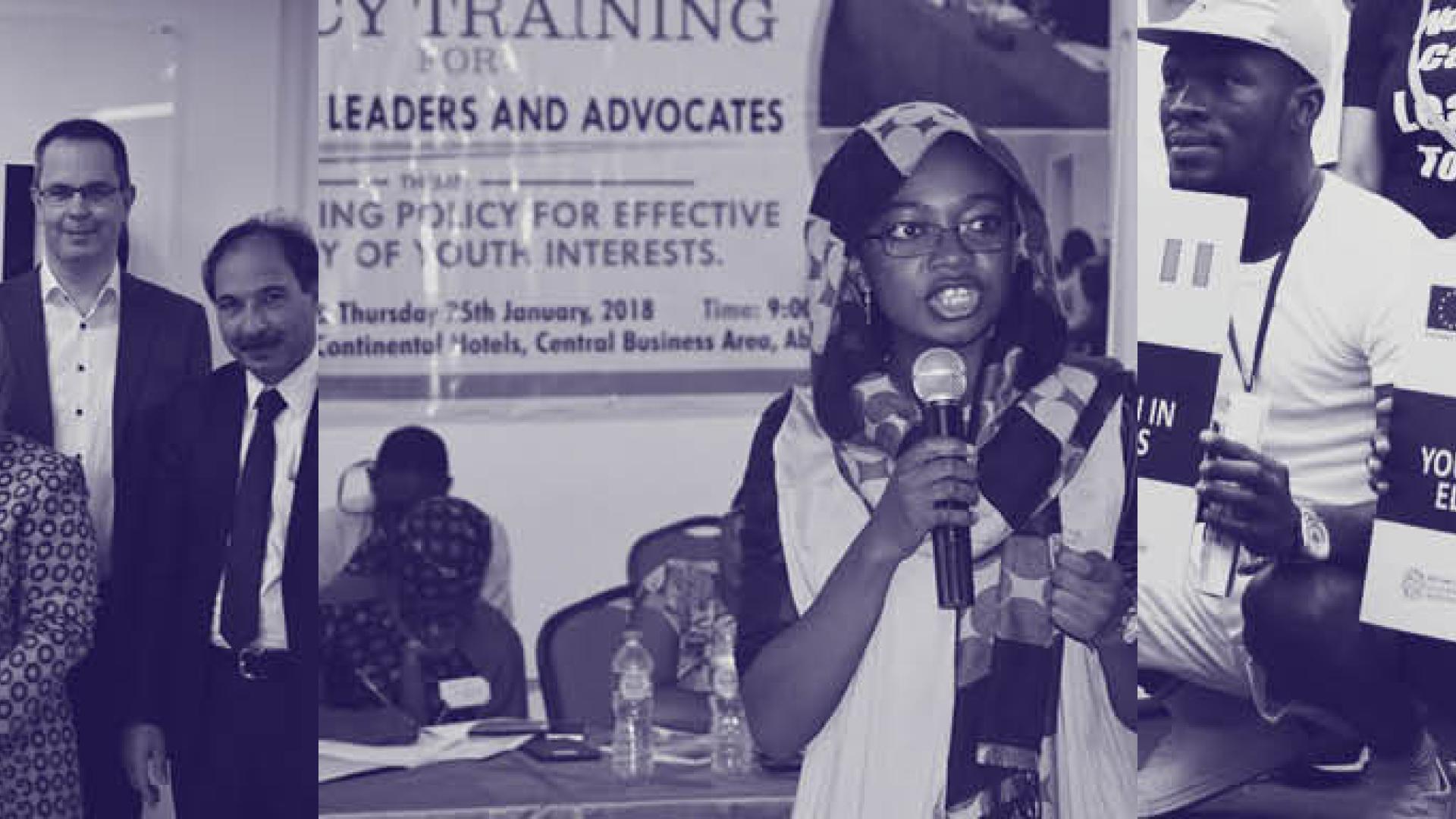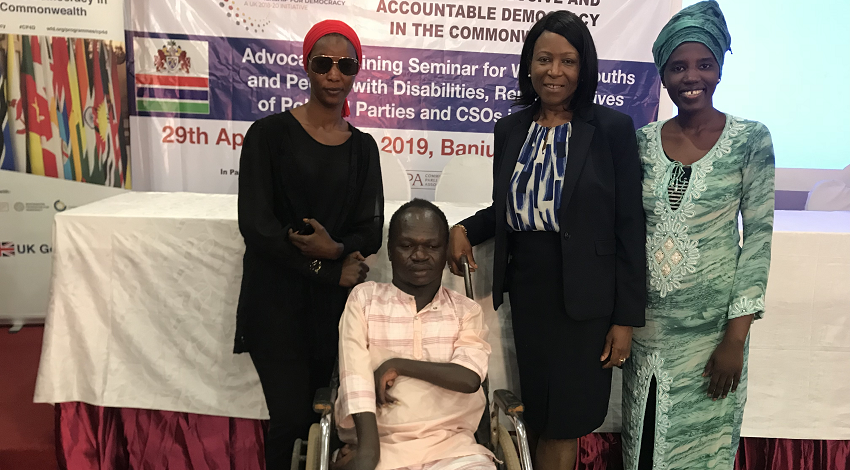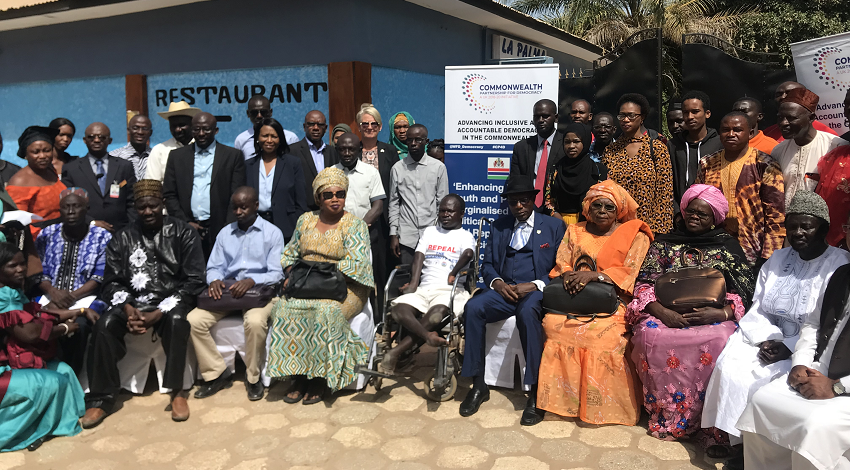Advancing inclusive democracy in The Gambia
Tina Fahm, WFD Associate, Commissioner at the Independent Commission for Aid Impact and an LSE Lay Governor, explains how WFD’s Commonwealth Partnership for Democracy is helping citizens participate in mainstream politics and have their voices heard.

The Gambia has 10 registered political parties. However, many have weak governance systems and a poor democratic culture. In most cases, these political parties are led by men with women, young people and persons with disabilities confined to subsidiary wings that limit their voice, power and ability to influence the party. I realised that these arrangements are not peculiar to The Gambia, as I had encountered similar in other African countries.
Against this background, through the Commonwealth Partnership for Democracy (CP4D) WFD recently held a week-long training course for people actively involved in politics or in political parties in The Gambia.
The aim of the event was to promote inclusion and accountability in The Gambian democratic process in ways that encourage participation of all citizens in mainstream politics.

Though most of the participants were already active in public life, some were considering entering politics for the first time. I was delighted to see a large number of women represented at the event, as well as young people – some of whom seemed unsure as to what a career in politics would entail and hoped attending the seminar would enlighten them further.
The five-day training course began by addressing core concepts fundamental to a functioning democracy such as rights, power, the role of political parties, civil society and social change, as well as an understanding of key concepts – inclusion, transparency and accountability.
For many participants the seminar offered an opportunity for personal growth and professional development across a wide range of relevant skills including advocacy, influencing, leadership and other competencies that drive inclusion. The agenda was designed to balance time spent on acquiring new knowledge with sufficient time to practice new skills, both in a safe environment with colleagues from the same party or organisation but also with participants from opposing parties, helping to foster inter-party relations and networks.
Discussions addressed sensitive issues relating to discrimination and exclusion, some participants gave personal testimonies on how discrimination had affected their lives and cited these experiences as their motivation for wanting to go into politics. The readiness to confront long-standing issues with courage and honesty, encouraged others to speak openly and challenge accepted social norms, such as the impact of tribalism on inclusion and assumptions about the role of women, young people and persons with disability in Africa.

Storytelling techniques were used as a way of dealing with sensitive issues and to illustrate where African culture and tradition had amplified differences between tribes and communities. While doing this, I realised that collectively the participants were representative of The Gambia’s diverse population, and the discussion enable us to delve into practices that were not inclusive and had become entrenched. As facilitator, it provided me with an opportunity to challenge party officers on what they were doing to address these issues, and they committed to addressing the issues through their manifestos.
The seminar considered these challenges – of persons with disabilities – particularly regarding accessibility and inadequate legal and regulatory protection.
Participants representing youth interests made it clear that with young people making up over 60 per cent of the current population, many feel disenfranchised with the current system, as they have very little influence in the political process.
Women also feel marginalised because political parties often see them only as mobilisers for their political campaigns where their roles included “clapping, dancing and cooking” rather than being given the opportunity to contribute with more meaningful actions.
It was heartening to observe that the seminar gave participants a snapshot of what an inclusive political landscape in The Gambia could look like, made up of different people, young and old, those who were new to politics and public life, those with many years’ experience, all working side-by-side productively.
The honesty expressed by participants was both humbling and refreshing. My enduring ‘take away’ from the event was a female participant from a rural constituency who told me that “political was not for people like her”. It was great that she felt able to contribute despite being shy and speaking only ‘broken English’. Though several senior party officials were present at the seminar, a key message that I wanted to get across was that all contributions were equally valued. So fellow participants listened and noticed her insightful contributions. I only realised that she had never spoken publicly at an event before from what she wrote on the evaluation form.:
“The presentation activity was the most valuable, and why, because I never have the courage to present but today I can.”
As a trainer, one never knows what impact one makes, particularly with relatively short standalone events. But I believe that this participant genuinely left the seminar more empowered, and able to pursue her goal of a future in politics which I found highly satisfying.
However, looking at the bigger picture, there is still a lot of work to be done to address current inequalities within political parties and help bring their practices more in line with an inclusive democracy.